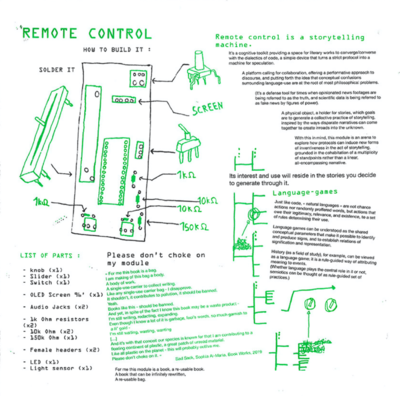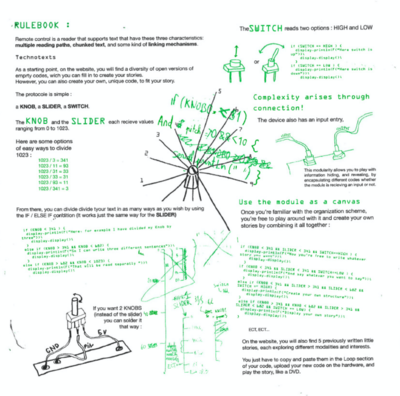User:Claxhanson/LFP: Difference between revisions
Claxhanson (talk | contribs) (Created page with " <span style="color:blue;font-family:Papyrus;text-align:right;font-size:14px;"> ''' STORYTELLING''' User:Claxhanson/proto | <span style="color:...") |
Claxhanson (talk | contribs) No edit summary |
||
| (2 intermediate revisions by the same user not shown) | |||
| Line 1: | Line 1: | ||
[[User:Claxhanson/ | =Remote Control= | ||
[[User:Claxhanson/ | This module is an arena to explore how protocols can induce new forms of inventiveness in the act of storytelling, grounded in the cohabitation of a multiplicity of standpoints, rather than a linear, all-encompassing narrative. | ||
Its interests and uses will reside in the stories you decide to generate through it. | |||
<br> | |||
[[File:Remoterecto.png|400px|frameless|left]] | |||
<br> | |||
===RULEBOOK :=== | |||
Remote control is a reader that supports texts that have these three characteristics: multiple reading paths, chunked text, and some kind of linking mechanisms.<br><br> | |||
Technotexts<br> | |||
Use the module as a canvas<br><br> | |||
[[User:Claxhanson/proto | <span style="color:blue;font-family:Papyrus;font-size:14px;text-align:right;"> ''' ARDUINO''']] | |||
<br><br> | |||
The protocol is simple :<br> | |||
a KNOB, a SLIDER, a SWITCH.<br><br> | |||
The KNOB and the SLIDER each receive values ranging from 0 to 1023.<br> | |||
The SWITCH reads two options: HIGH and LOW. <br> | |||
From there, you can divide your text in as many ways as you wish by using the IF / ELSE IF condition<br><br> | |||
<br> | |||
===LANGUAGE GAMES :=== | |||
Just like code, « natural languages » are not chance actions nor randomly proffered words, but actions that owe their legitimacy, relevance, and existence, to a set of rules determining their use.<br><br> | |||
Language games can be understood as the shared conceptual parameters that make it possible to identify and produce signs and to establish relations of signification and representation.<br><br> | |||
History (as a field of study), for example, can be viewed as a language game: it is a rule-guided way of attributing meaning to events.<br><br> | |||
(Whether language plays the central role in it or not, semiotics can be thought of as a rule-guided set of practices.)<br><br> | |||
[[File:Remoteverso.png|400px|frameless|left]] | |||
On this website, you will find a diversity of open versions of empty codes, which you can fill in to create your own stories.<br> | |||
However, you can also create your own, unique code, to fit your story. You will also find 5 previously written little stories, each exploring different modalities and interests. You just have to copy and paste them in the Loop section of your code, upload your new code on the hardware, and play the story, like a DVD.<br><br> | |||
[[User:Claxhanson/methods | <span style="color:blue;font-family:Papyrus;text-align:right;font-size:14px;"> ''' STORYTELLING''']] <br> | |||
<div style="background:blue"> | |||
==⇨ https://www.deplayer.nl/releases/dob-101-0 ⇦== | |||
==⇨ https://www.deplayer.nl/events/de-player-experimental-publishing-xpub-present-inputoutput ⇦== | |||
</div> | |||
<br><br> <br> </span> </div> | |||
Latest revision as of 02:04, 2 October 2020
Remote Control
This module is an arena to explore how protocols can induce new forms of inventiveness in the act of storytelling, grounded in the cohabitation of a multiplicity of standpoints, rather than a linear, all-encompassing narrative.
Its interests and uses will reside in the stories you decide to generate through it.
RULEBOOK :
Remote control is a reader that supports texts that have these three characteristics: multiple reading paths, chunked text, and some kind of linking mechanisms.
Technotexts
Use the module as a canvas
ARDUINO
The protocol is simple :
a KNOB, a SLIDER, a SWITCH.
The KNOB and the SLIDER each receive values ranging from 0 to 1023.
The SWITCH reads two options: HIGH and LOW.
From there, you can divide your text in as many ways as you wish by using the IF / ELSE IF condition
LANGUAGE GAMES :
Just like code, « natural languages » are not chance actions nor randomly proffered words, but actions that owe their legitimacy, relevance, and existence, to a set of rules determining their use.
Language games can be understood as the shared conceptual parameters that make it possible to identify and produce signs and to establish relations of signification and representation.
History (as a field of study), for example, can be viewed as a language game: it is a rule-guided way of attributing meaning to events.
(Whether language plays the central role in it or not, semiotics can be thought of as a rule-guided set of practices.)
On this website, you will find a diversity of open versions of empty codes, which you can fill in to create your own stories.
However, you can also create your own, unique code, to fit your story. You will also find 5 previously written little stories, each exploring different modalities and interests. You just have to copy and paste them in the Loop section of your code, upload your new code on the hardware, and play the story, like a DVD.
STORYTELLING
⇨ https://www.deplayer.nl/releases/dob-101-0 ⇦
⇨ https://www.deplayer.nl/events/de-player-experimental-publishing-xpub-present-inputoutput ⇦


